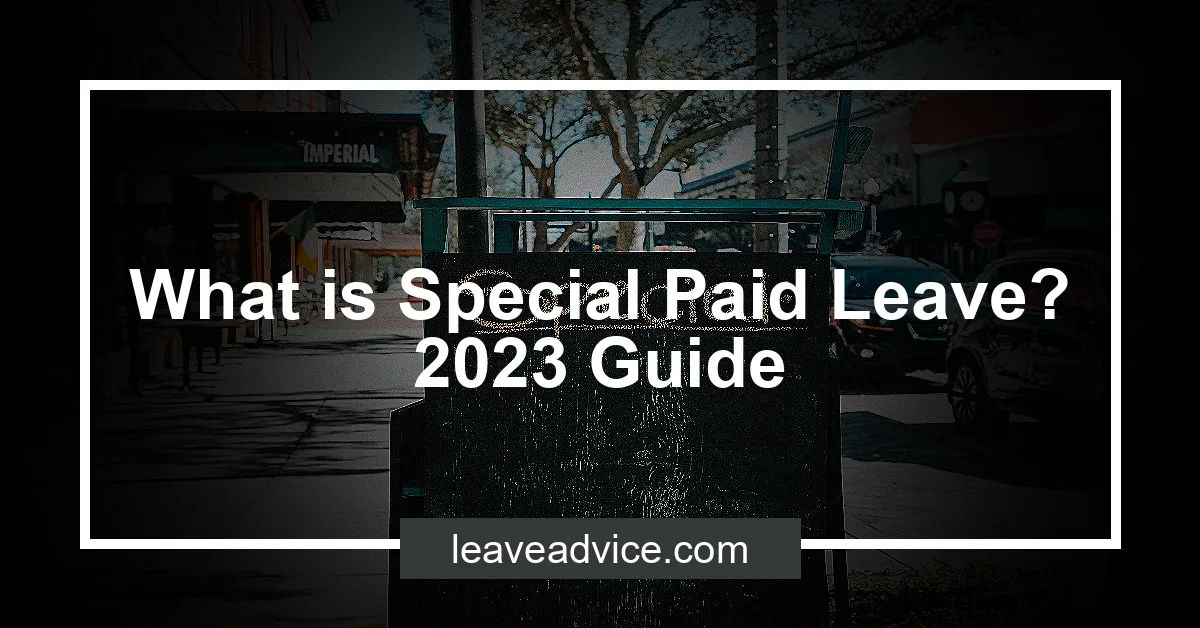What is Special Paid Leave? 2023 Guide
Special paid leave is a type of leave granted to an employee who needs to be absent from work during working hours which do not come under other types of leave, and they will be paid their regular salary during this period. This type of leave can be granted for various reasons and is important in ensuring employee satisfaction and well-being in the workplace.
What is Special Paid Leave?
Special Paid Leave is a type of leave with pay that is granted to employees for specific purposes that do not fall under other types of leave. There are different types of Special Paid Leave, and certain conditions apply for its use.
- Definition and types of Special Paid Leave: Special Paid Leave can be granted for various reasons, including:
- Attending to personal or family matters, such as death, marriage, or illness
- Volunteering for disaster relief efforts or serving as poll workers during elections
- Conducting union or employer operations, such as grievance procedures or negotiations
- Participating in professional development or training
- Other circumstances deemed appropriate by the employer or collective bargaining agreement
- Conditions for Special Paid Leave: The use of Special Paid Leave is subject to certain conditions, including:
- Prior approval from the employer
- Evidence or documentation of the reason for the leave, if requested by the employer
- Limitations on the duration and frequency of the leave, as specified by the employer or collective bargaining agreement
- Difference between Special Paid Leave and other types of leave: Special Paid Leave differs from other types of leave, such as sick leave or vacation leave, in that it is granted for specific purposes that do not fall under other categories of leave. Special Paid Leave is also typically subject to different conditions and limitations, as specified by the employer or collective bargaining agreement.
Examples of Special Paid Leave
Special Paid Leave is a type of leave granted to employees who need to take time off work for reasons that do not fall under any other types of leave. Here are some real-life scenarios and examples of how Special Paid Leave may be granted to employees:
- Illness or injury: If an employee is sick or injured, they may be granted Special Paid Leave to recover without having to worry about losing pay during their absence.
- Family emergencies: If an employee needs to take time off work due to a family emergency, such as a death in the family or a sudden illness of a family member, they may be granted Special Paid Leave.
- Civil duty: If an employee is called to serve on a jury or is summoned to appear as a witness in court, they may be granted Special Paid Leave for the duration of their absence.
- Community service: Some companies may offer Special Paid Leave to employees who choose to participate in community service programs or volunteer work.
How companies handle Special Paid Leave requests: The process for requesting and granting Special Paid Leave may vary between companies. Some companies may require employees to provide documentation or proof of the reason for their absence, while others may have a more flexible approach.
It’s important for both employers and employees to understand their rights and responsibilities when it comes to Special Paid Leave.
Why is Special Paid Leave Important?
Special Paid Leave is an essential type of leave that is granted to employees for reasons other than regular leave entitlements such as sick, annual, or personal leave. Here are the reasons why having Special Paid Leave can positively impact the company:
- Positive impact on employee engagement and satisfaction – employees who feel supported by their employer have higher job satisfaction rates, leading to increased engagement and productivity.
- Improved work-life balance for employees – Special Paid Leave allows employees to take time off from work for personal or family reasons, providing them with the chance to recharge and find balance in their lives.
- Mitigating risks for both employers and employees – by providing a formal policy around Special Paid Leave, employers can reduce the risk of employee burnout, absenteeism, or lawsuits that may arise from unsupported employee absences.
Offering Special Paid Leave can make the company a more attractive place to work, help reduce employee turnover rates, and positively impact overall company culture and morale.
Reasons for Special Paid Leave
Special Paid Leave is granted to employees for specific circumstances that do not fall under other types of leave. Some reasons for granting Special Paid Leave include:
- Emergency situations and personal/family medical issues: Employees may need to take time off to care for themselves or their family members in the event of a medical emergency.
- Mental health concerns and stress management: Employers may grant Special Paid Leave to employees who are dealing with mental health issues and require time off to seek professional help.
- Domestic violence and harassment situations: Employees who have experienced domestic violence or harassment may require time off to deal with the aftermath or seek legal assistance.
In addition to these reasons, Special Paid Leave may also be granted for other unique situations that do not fall under typical leave policies.
Frequently Asked Questions
Can an employee take Special Paid Leave without prior notice?
Is Special Paid Leave mandatory for all companies?
What happens if an employee exhausts their Special Paid Leave?
Conclusion
Special paid leave is an important benefit for employees. It allows them to take time off for situations that don’t fall under other types of leave, while still receiving payment.
This can include anything from attending to family emergencies, caring for a sick loved one, or dealing with personal or mental health issues. The availability of special paid leave, along with other types of paid time off, helps promote employee engagement, productivity, and well-being.

